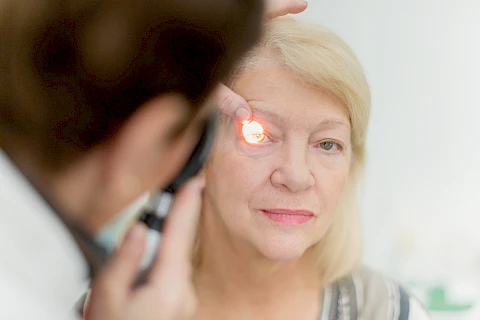
One common age-related eye condition that many seniors face is cataracts. Cataracts cause cloudy or blurred vision and can significantly impact daily life. Maintaining good eye health is necessary for seniors to preserve their independence and quality of life. Learn about cataracts, their symptoms, risk factors, prevention tips, and treatment options to equip yourself with valuable information to help protect your vision.
All About Cataracts
Cataracts occur when the lens of your eye becomes cloudy, leading to impaired vision. The lens, which is located behind the iris and pupil, is responsible for focusing light onto the retina. When it becomes cloudy, light is scattered, resulting in blurred or cloudy vision. Cataracts develop slowly over time and can affect one or both eyes.
Some symptoms of cataracts include cloudy or blurred vision, trouble seeing at night, sensitivity to light, seeing halos around lights, and frequent changes in prescription glasses. These symptoms can make everyday tasks like reading, driving, and recognizing faces challenging.
Several factors can increase the risk of developing cataracts. Age is the most significant risk factor, as most cataracts appear after age 60. Other risk factors include a family history of cataracts, diabetes, prolonged exposure to sunlight, smoking, excessive alcohol consumption, and previous eye injuries or surgeries.
Prevention Tips
Preventing cataracts involves adopting a healthy lifestyle and protecting your eyes. Wearing sunglasses can protect your eyes from the harmful ultraviolet (UV) rays of the sun. Look for sunglasses that block 100% of UVA and UVB rays.
Eating a diet rich in fruits and vegetables can help keep your eyes healthy. Foods high in antioxidants, such as vitamins C and E, can reduce the risk of cataracts. Include leafy greens, carrots, citrus fruits, and nuts in your diet.
Having regular eye check-ups can help detect cataracts early. Your eye doctor can monitor your eyes' health and recommend any necessary treatments or lifestyle changes. Smoking and excessive alcohol consumption can increase the risk of cataracts. Quitting smoking and drinking alcohol in moderation can promote better eye health.
Treatment Options
If you already have cataracts, several treatment options are available to improve your vision.
In the early stages of cataracts, non-surgical treatments may help improve vision. These include using stronger prescription glasses or contacts to manage vision problems caused by mild cataracts. Magnifying lenses can also be useful for reading and other close-up tasks.
When cataracts significantly interfere with daily activities, surgery may be necessary. Cataract surgery is a common and effective procedure in which the clouded lens is removed and replaced with a clear artificial lens. The surgery is usually performed on an outpatient basis and takes about an hour or less. The surgeon makes a small incision in the eye to remove the cloudy lens and replace it with an artificial intraocular lens (IOL).
There are two main types of cataract surgery: phacoemulsification and extracapsular surgery. Phacoemulsification involves using ultrasound waves to break up the cloudy lens, which is then removed in small pieces. Extracapsular surgery involves removing the cloudy lens in one piece through a larger incision.
Cataract surgery has a high success rate, and most people experience significantly improved vision after the procedure. It can enhance the quality of life by making daily activities easier and reducing the risk of falls and accidents.
Recovery Process
After cataract surgery, follow your doctor's instructions for a smooth recovery. For a few days, you may experience mild discomfort, itching, or sensitivity to light. Your vision may be blurry initially, but it should improve gradually.
To ensure a smooth recovery, use prescribed eye drops to prevent infection and reduce inflammation. Avoid rubbing or pressing on your eye, and wear an eye shield while sleeping to protect your eye. Attend all follow-up appointments with your eye doctor to ensure your eye is healing correctly. They will check your vision and make any necessary adjustments.
We Can Help Seniors Care for Their Eyes
Cataracts are a common eye condition among seniors, but by understanding the symptoms and risk factors, you can take proactive steps to protect your vision. Remember the prevention tips, such as wearing sunglasses, maintaining a healthy diet, and having regular eye check-ups. If you need treatment, cataract surgery is a highly effective option with excellent success rates.
Senior Helpers of Richmond is here to provide assistance and support to those in Richmond, Mechanicsville, Henrico, and Sandston. Contact us today to learn more about our senior care services!